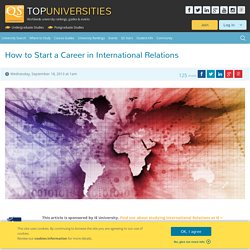

Anthropology degrees. What do anthropology degrees cover?

If you decide to study anthropology, you may draw upon subjects such as sociology and economics, which seek to better understand individual and group behaviors through the application of scientific methods. However, even the broadest sociology or economics degree is unlikely to come close to matching the range of topics and approaches that may be offered within the different types of anthropology courses. What other degree would allow you to explore subjects as diverse as forensic science, religious symbolism, language structure, and similarities between the human brain and those of other animals? Entry requirements for anthropology degrees Entry requirements to study anthropology degrees tend to be quite flexible, reflecting the diversity of the subject itself. Course structure and assessment methods Most anthropology courses last for three or four years at undergraduate level and one or two years at master’s level, depending on the country of study.
Anthropology - Career Paths. A Career in International Relations. This article is sponsored by IE University.

Find out about studying International Relations at IE > Generally, careers in international affairs exist across three sectors: public, private and non-profit/NGO. Governments, international organizations, multinational companies, development consulting firms, NGOs, and think tanks are typical employers in the international relations arena. Here are some tips to help those on the lookout for international relations careers. 1. A graduate degree is a prerequisite in the sphere of international affairs. Due to the multidisciplinary nature of the program, a master’s in international relations will open the doors to a wide range of international relations careers. 2. Due to the differing focuses and specializations of international relations programs offered by universities, it is necessary to do in-depth research before sending out an application. 3. 4. 5. By Shuo Xing, Associate Director of the IE Career Management Center.
What can I do with a politics degree? Skills Your head might be crammed full of useful (and some not-so-useful) information, but your politics degree will also help you to develop a wealth of useful skills… Analytical Skills You’re better than Shearer and Hansen put together.

You’re even better than Gary Neville. Fortunately, your top-notch analytical skills also extend beyond the world of football punditry. Politics Degrees. What do politics degrees cover?

Politics degrees are likely to include examination of past and current political conflicts; different models and mechanisms of government; concepts such as freedom, equality and human rights; and ideologies such as communism, anarchism and liberalism. Sounds like a lot to take on, doesn’t it? But after all, politics affects every aspect of human life, from the mundane (how often your rubbish is collected) to the philosophical (individual freedom versus ‘greater good’). Careers with a Sociology degree. Sociology is a social science which helps to make sense of the way in which society works.

Those who study sociology will become adept in understanding and analyzing sociological issues and devising potential solutions and improvements, perhaps by addressing social inequalities relating to factors such as class, gender, race and poverty. Sociologists don’t just study their own societies; they look at the far reaches of human society both past and present, gaining insight into how societies develop and organize themselves. Why Study Business? Business and related subjects (such as the ‘FAME’ group – finance, accounting, management and economics) are among the most popular fields of study at universities worldwide, particularly at graduate level.

You might have some vague ideas about why this is the case – business graduates are in high demand worldwide, business touches on pretty much every aspect of modern human society, careers with a business degree are diverse and often highly paid – and these assumptions are likely to be largely true. But if you’re still not quite convinced, here’s a deeper exploration of the question, ‘Why study business?’ Careers with an Economics Degree. Careers in economics are as diverse as they come, with job roles covering everything from food and agriculture to business and banking.

Depending on your area of interest, an economics degree will help you develop specialized analytical skills, enabling you to successfully enter multiple industries as a professional economist, or as another type of professional with an eye for economics. An economics degree will boost your employability in many areas, regardless of the industry you work within. This reflects strong demand for highly numerate graduates throughout the global labor market, and the widely transferable analytical and problem-solving skills developed by economics students.